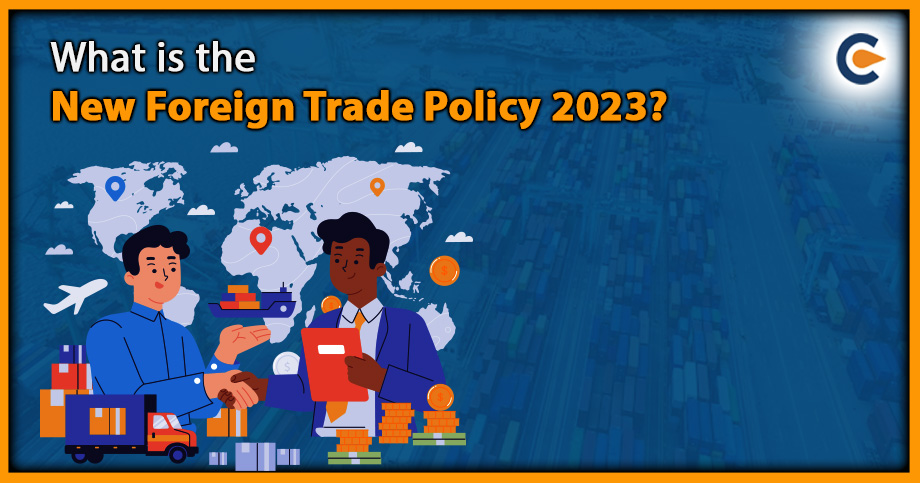Shri Piyush Goyal launched the Foreign Trade Policy 2023 on March 31, 2022. He is the union minister of Commerce and Industry, Consumer Affairs, Food and Public Distribution and Textiles. He further stated that this policy is made keeping in mind the need of the current economy. Moreover, this policy has been in discussion for a long time, and a lot of expert opinions have been in this regard. He further added that Indian exports are already rising at a high pace as it has crossed US$ 750 Billion and may cross US$ 760 billion by the end of this year.
Back in August 2021, Prime Minister Shri Narendra Modi[1] had a discussion with exporters where he encouraged them to increase exports as it is very beneficial for the economy of India. Therefore, this policy is made keeping in mind that there are chances of growth and India can reach great heights in terms of exports. This is the vision of the new foreign trade policy 2023.
The minister also emphasised the reason for the growth in exports. He said that the exports are near to reaching US$ 760 billion due to the roadmap set by the prime minister in 2021 and the encouragement that he has provided to the exporters. Furthermore, he suggested that every export opportunity must be taken and fulfilled in the best possible manner.
Key Approach of the New Foreign Trade Policy 2023
- Remission Incentives
- Promotion of exports due to collaboration
- Reducing the cost of transactions and promoting e-initiatives to ease the process of doing business.
- The policy will mainly focus on emerging areas such as e-commerce and export hubs.
What is New Foreign Trade Policy 2023?
The Foreign Trade Policy 2023 is a statement that outlines policy and is flexible and receptive to the needs of trade. It is founded on the continuation of tried-and-true export facilitation programs. Its foundation is confidence and collaboration with exporters. In the FTP 2015–20, adjustments were made after the original release, even without notice of a new FTP that would react quickly to the circumstances as they developed. The FTP will then be revised as and when necessary going forward. To continually streamline procedures and occasionally update FTP, it would also be required to incorporate input from Trade and Industry.
The New Foreign Trade Policy 2023 seeks to automate and re-engineer processes to make it easier for importers to conduct business. Additionally, it emphasises developing areas like SCOMET’s dual-use high-end technology products, enabling e-commerce sales, and working with States and Districts to promote exports.
The new FTP is introducing a one-time amnesty program to allow importers to finish up any old outstanding authorisations and start over. Through the “Towns of Export Excellence Scheme” and the “Status Holder Scheme,” the Foreign Trade Policy 2023 promotes the acknowledgement of new cities and importers. By simplifying the well-known Advance Authorization and EPCG programs and allowing merchanting trade from India, the Foreign Trade Policy 2023 is easing exports.
Highlights of the Policy
The New Foreign Trade Policy 2023 talks about various things related to trade and exports. Here are the highlights of the policy:
- New Towns Added To The Towns Of Export Excellence
In order to increase the export of handloom, carpets and handicrafts, four new towns are added to the list of already existing 39 towns of export excellence (TEE). These towns are Varanasi, Moradabad, Faridabad, and Mirzapur. The TEE has numerous advantages as they get the export promotion fund that comes under the MIA scheme. Moreover, all these cities can benefit from a common service provider to fulfil the export requirement under the scheme of EPCG.
- Exporters Will Be Recognized
The exporters who will have the best performance in exports and are recognised with ‘status’ will be treated as partners in the capacity-building initiative. Moreover, the exporters with more than two stars and above status will be motivated to take sessions for exports to guide them and provide training to those who are interested. The government is of the view that this will help India in becoming a $5 Trillion economy by 2023. There are specific changes made in the status application system so that more exporters can get 4 and 5 stars, and this will bring more export opportunities to India.
- Change In Process
The policy focuses more on export promotion. Therefore, it promotes technology and collaboration rather than incentive schemes. Certain scenes that were a part of FTP 2015 will stay the same, making more advancements to the technology in order to promote export and make its facilitation process easy. The new policy focus on a paperless mechanism by way of online activities. This makes it easy for the exporters to do business with ease. Reduction in fee structure and promotion technology via the IT sector will bring the MSMEs to the export market and eventually increase the export.
The process of duty exemption and production of export will be done through the office of the registrar in a streamlined way through an online system. This will eliminate manual filing. The Advance and EPCG Schemes will encompass all procedures, including issuance, revalidation, and EO extension, in a gradual way during FY23 – 24. Cases found under the risk management framework will be examined directly, but initially, it is anticipated that most candidates will go through the “automatic” path.
- Mercantile Trade Will Be Possible
Mercantile trade is when goods from one foreign country are transferred to another country, but it does not touch any Indian port, only involving an intermediary from India. India does not still support mercantile trade, but the new trade policy has brought some provisions to make India a hub for such trade. The exports will now be able to do mercantile trade for the items that were prohibited or restricted in the export policy. This will take place only in accordance with the rules of RBI. Moreover, mercantile trade will still not be available for goods mentioned in the list of CITES and SCOMET. In contrast, the new policy will allow India to make some particular cities, such as GIFT as their mercantile hub as seen in other countries like Dubai.
- Encouraging Exports at the Grassroot Level
For developing the grassroot level, the government has thought of encouraging exports at the district level. To make this possible, the government will collaborate with the state government and make districts as export hubs for storing material. Moreover, there will be an institutional mechanism at the district level to identify the products and services that can be exported and solve other concerns. The committees that will look after such concerns are State Export Promotion Committee at the state level and District Export Promotion Committee at the District level. Each district will have a different strategy to promote exports, so that export action plans will be made for each district.
- Establishing the Process of the SCOMET Policy
India is emphasising the “export control” regime more and more as its cooperation with export control regime nations grows. Stakeholders are more aware of SCOMET (Special Chemicals, Organisms, Materials, Equipment, and Technologies), and the policy framework is being strengthened to execute international accords and agreements that India has signed. A strong export control mechanism in India would enable exporters to acquire dual-use, high-end goods and technologies while allowing the export of SCOMET-controlled goods and technologies from India.
- Amnesty Scheme
Special one-time Amnesty Program for Export Obligation Default Relief should be given to exporters who are unable to perform their EO against the EPCG and Advance Authorizations in the interest of trade and industry and to inspire them. The introduction of an amnesty program for users of Advance Authorization and EPCG authorisations who accidentally breach an export requirement. The authorisation bearer may regularise any outstanding instances of export obligation (EO) failure for the aforementioned authorisations upon payment of all customs duties exempted in proportion to outstanding export obligation, with a maximum interest limit of 100% of such duties exempted.
However, the exporter is not required to pay any interest on Additional Customs Duty and Special Additional Customs Duty. This scheme will be open for a limited period till September 30, 2023. The cases that are under investigation for fraud and diversion do not come under this scheme.
- Export Facilitation Through E-Commerce
Exports through e-commerce are a promising sector that needs different types of policy initiatives than conventional offline trade. By 2030, the possibility of e-commerce exports is estimated to be between $200 and $300 billion. The goal and plan for creating e-commerce centres, along with related components like payment reconciliation, bookkeeping, returns policy, and export rights, are described in FTP 2023. The consignment-based limit for courier-based E-Commerce shipments has been increased from $5 lakh to $10 lakh in the FTP 2023 as a beginning point. This limit will either be further modified or ultimately eliminated based on exporters’ input.
Exporters will be able to make FTP claims if courier and postal shipments are integrated with ICEGATE. Based on the working group’s recommendations on e-commerce exports and inter-ministerial discussions, the complete e-commerce policy covering the export/import ecosystem will be developed shortly. In order to increase the ability of craftsmen, weavers, clothing makers, gem and jewellery designers, and other industry participants, extensive marketing and training initiatives will be implemented.
- Facilitation Under The Scheme For Advance Authorization
In advance approval Similar to the EOU and SEZ schemes, the scheme used by DTA facilities allows the duty-free purchase of raw materials to produce export goods. The DTA unit, however, is adaptable enough to operate for both local and export output. Based on discussions with business and Export Promotion Councils, the current FTP now includes measures for assistance like:
- The Special Advance Authorization Scheme was expanded to include exports of the apparel and clothing sector under paragraph 4.07 of the HBP on a self-declaration basis to enable the expeditious fulfilment of export orders. Norms would be established within a set timeline.
- The benefits of the Self-Ratification Scheme for fixing Input-Output Norms are currently expanded to individuals with two stars and higher statuses in addition to Authorized Economic Operators.
Export Promotion of Capital Goods (EPCG) Scheme Facilitation
A further rationalisation is being made to the EPCG Scheme, which permits purchasing capital products at zero Customs tax for export manufacturing. Some significant additions include:
- As a new Prime Minister, Mega Integrated scheme qualified to receive benefits under the CSP (Common Service Provider) Scheme of Export Promotion Capital Goods Scheme.
- Textile Region and Apparel Parks (PM MITRA) scheme has been introduced (EPCG).
- The dairy industry will be excused from keeping its average export obligation to help it modernise its technology.
- All types of battery electric vehicles (BEV), vertical farming tools, wastewater treatment and recycling systems, rainwater harvesting systems, rainwater filters, and green hydrogen have been added to the list of green technology products that are now eligible for a reduced export obligation requirement under the EPCG Scheme.
Which Sector Will Benefit From The New Foreign Trade Policy 2023?
Following are the benefits of New Foreign Trade Policy 2023:
- Green technology products will also include farming equipment and battery vehicles.
- PM Mega Integrated Textile Region and Apparel Parks is another CSP-eligible program.
- Benefits accrue to the dairy industry, which is also exempt from continuing to keep the average export requirement.
- Green technology goods now include rainwater gathering systems, wastewater purification, and recycling.
- Added features to green technology goods, including rainwater filters and renewable hydrogen.
- Under the EPCG plan, green technology goods are qualified for lower export obligation requirements.
Conclusion
Foreign Trade Policy should be flexible and adaptable to changing trade conditions – greater involvement of States and Districts in promoting trade at the local level. Focus on e-commerce exports to simplify procedures and facilitate the expansion of exports in the e-commerce market. To reach the objective of one trillion dollars in merchandise shipments by 2030, sector-specific goals must be met. It is a mechanism for consultation to settle commercial and industrial problems. Work towards making Indian Rupees a universal money and enabling INR payment for international trade – Department of Commerce restructuring to prepare for the future.
Also Read:
Foreign Trade Policy 2021-2026: What To Expect Amidst Covid-19 Pandemic?











